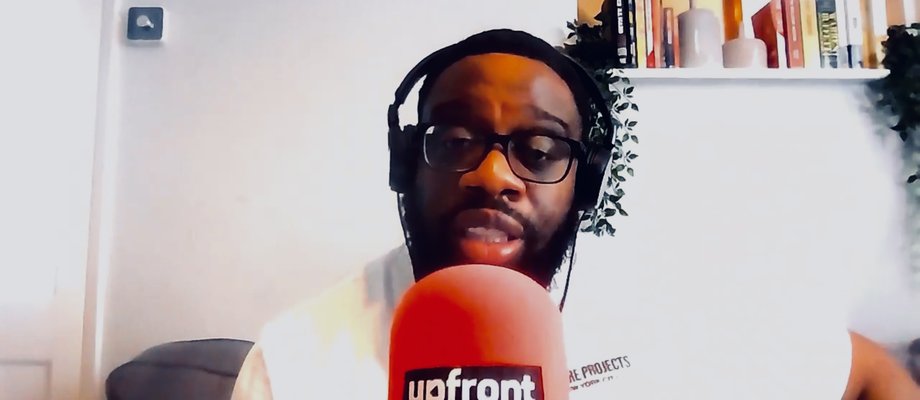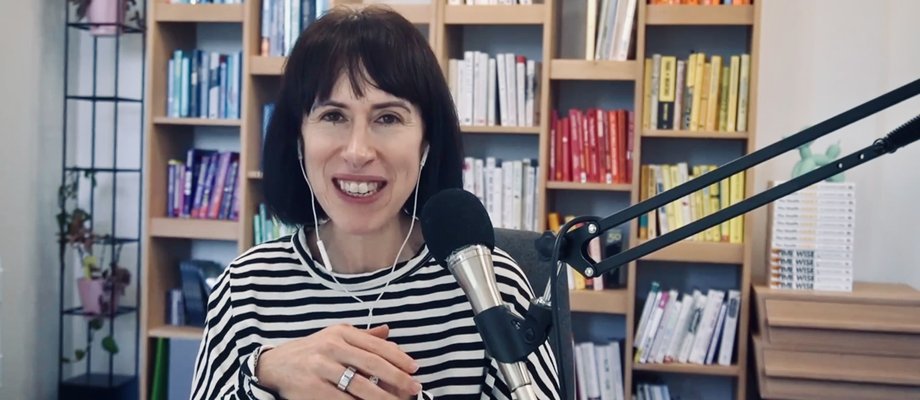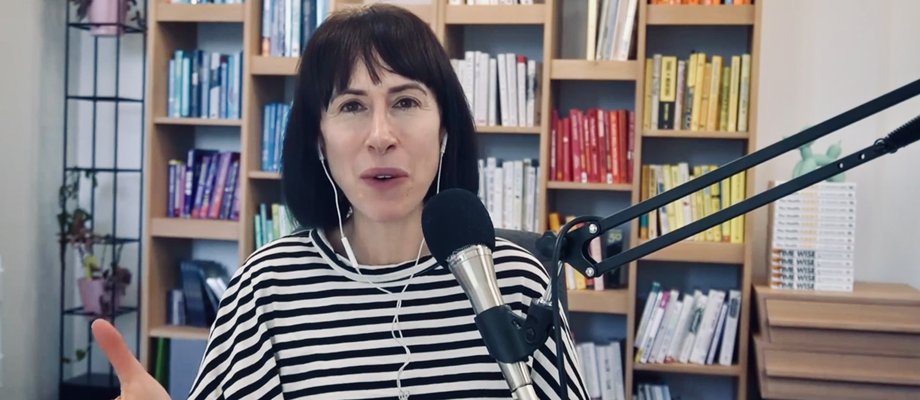Do we have to get up at 5am to be successful? That's the Upfront question for organisational psychologist Dr Amantha Imber, who chats to Emmanuel Asuquo about how we can all be our most effective and productive selves.
Here are some highlights from that conversation. Listen to the episode in full here.
Emmanuel: We always start with our Upfront question and today, the question is, do we have to get up at 5 a.m. to be productive?
Amantha: Oh, it's a myth. You don't have to get up at 5 a.m. Let the night people rejoice! From a scientific point of view, it comes down to a concept called chronotypes, where every one of us is different in terms of when the peaks and troughs of our energy levels are in 24 hours. There are three types of chronotypes. There are larks, those 5 a.m. clubbers who naturally rise and shine at about 5 or 6 a.m. There are owls who are the opposite. They come to life at night and naturally like a bit of sleep. And then there are middle birds who operate on the schedule of a Lark but are delayed by an hour or two. So if you naturally wake up at about 7 a.m. and don't have an alarm set, you're probably a middle bird. One of my big pieces of advice when it comes to productivity is to understand your chronotype and proactively schedule your day around that. So if you're an owl, don't get up at 5 am, that's a disaster waiting to happen.
Emmanuel: Oh, I love that. I'm definitely that middle bird and I'm going to be proud.

Emmanuel: What does a typical day look like for you? How do you keep yourself productive?
Amantha: I am lark-ish, so I naturally get up at about six, maybe 6:30 a.m. My brain is best in the morning, so I typically don't schedule meetings for the morning, and I use that time to work on my biggest, most challenging projects, so I use that time for deep, focused work. I typically have most of my meetings in the afternoon and try to disconnect at about 5 o'clock. One of the big things that I do that I feel helps my productivity is time boxing or time blocking, where I book meetings with myself, depending on what projects I want to get done which reduces procrastination.

Emmanuel: I feel like I'm a procrastinator. What trends are you seeing with the way people are working? What does good look like now?
Amantha: I think that the better employers definitely embrace ultra flexibility. So, I'm talking about the opposite of a back-to-office mandate where people have control over where they work, their work hours, and how they get their work done. And even though everyone talks about generative AI, I'm still very surprised by the lack of people using it daily to augment their work. For the last year and a half, I've used Gen AI, including ChatGPT and Claude, to help me with my work. It makes me so much more productive if I'm feeding it the right tasks. And quite frankly, I think that people that are not leaning into that, particularly knowledge workers, are at a distinct disadvantage.
I'm still very surprised by the lack of people using generative AI to augment their work. Frankly, people not leaning into it are at a distinct disadvantage.
Organisational Psychologist
Emmanuel: Why do you think we've become so obsessed with being efficient and productive? And what impact does it have on our health and well-being?
Amantha: I think it's having a terrible impact on our health. It comes from hustle culture and tech bro culture, and that was pretty cool quite a few years ago, and maybe that still is a bit cool for some people, but the pandemic has taught us just how important our mental health and well-being are, and if we don't have that, then all of the productivity hacks in the world are not going to help you have more impact in your job. We need to set better boundaries to maintain our well-being and productivity.
Emmanuel: You've interviewed some big CEOs and high performers on your podcast 'How I Work'. What are some of the craziest or most extreme things you've heard them do? And what's the best advice you've heard from them?

Amantha: The one that has stuck with me is this tip from Rahul Vora, a very successful Silicon Valley tech founder and CEO. One of the keys to his productivity is learning keyboard shortcuts and reducing how much time he uses a mouse for things. And that might sound small and inconsequential, but if you're a desk-based worker, as I imagine, a lot of your listeners are part of your day and the speed at which you can get through things and process things is based on how quickly you can navigate, around your computer screen. And it is much quicker to do things on your keyboard than going from your mouse to your keyboard, mouse to your keyboard. And so, after hearing him say that, I've invested a lot more time learning keyboard shortcuts for the various software programs I use.
Why do you think we've all become so obsessed with efficiency and productivity?
Host
Emmanuel: I love that. Now, you have mentioned AI and Chat GPT, and, although this podcast is for everybody, it is mainly for people in financial services. I don't know if you know financial services well, but we are pretty much scared of all new technology. If we could, we'd be using paper and pen forever. What would you say to get people to embrace technology and the new wave?
Amantha: I think people listen to podcasts because they're generally seeking self-improvement and self-optimization, and I think people like that, and like us, want to know, what are the things that I can do to give myself a competitive advantage in this world of work? And that's where technology comes in. I feel like I use technology to give myself a competitive advantage over other people and other businesses. That's why I've lent into AI: every single day, I'm getting a huge competitive advantage over everyone who's not using it.
Emmanuel: What are your thoughts about phones? Are they good for us? Are we addicted? Can we live without them?

Amantha: Oh, I think many people are addicted to their phones. The applications on phones are designed to be like mini gambling pokies machines that we have in our pocket. The people that are designing the apps know how to keep us hooked. Here are some tips I'll share regarding managing distractions - obviously, turn notifications off. That's a hygiene factor. Think about your day, try to check your phone less, and do not give in to that distraction. How many minutes or hours over a day is your phone more than an arm's length reach away? For most people, that would be almost zero minutes. So, one strategy is changing your environment and making checking your phone harder. Leave your phone in a different room to where you are. Or if it needs to be in the same room, put it in a drawer below where it's a slight effort to grab your phone. The second thing that I'd recommend is switching your phone to grayscale. There is an accessibility mode on the iPhone that turns your phone from being a very exciting, colourful little gambling machine with like all the, you know, pings and dings and bright colours to something incredibly dull and just shades of grey. So switch your phone to grayscale, and I guarantee you, Instagram is not particularly addictive if you're looking at it in black and white.
Emmanuel: Wow. I did not even know that existed. That is fantastic.
Switch your phone to grayscale. Instagram is not particularly addictive if you're looking at it in black and white.
Organisational Psychologist
Emmanuel: People in finance are among the worst when it comes to working long hours. It's almost like a badge of honour. Have you got any tips to help our audience there?
Amantha: It's a flawed belief system. The onus is on people and teams to question your thinking when you see people messaging you on email or instant messenger after hours, whether that be early or late. Don't see that as a sign of productivity or that someone should be rewarded. It's simply a sign that they sent a message at that point in time. So, people need to lean into rewarding the outcomes instead of the hours and challenging those unconscious beliefs.
Emmanuel: So, what do you think companies should be doing to help healthily boost productivity?
Amantha: I think that companies need to start seeing productivity as a skill that can be taught and that there are better and worse ways of working.
People in finance are among the worst for working long hours - it's almost a badge of honour.
Host
Emmanuel: I guess the last question goes out to our listeners who may feel burnt out or tired. Do you have any tips to help them get some energy back?
Amantha: I think the obvious thing to do is to prioritize sleep. Sleep is the foundation for everything. I would encourage people to set an alarm for when they need to go to bed and prioritize being in bed for between seven and nine hours. Everyone's a little different, but that is one of the most powerful things you can do to wake up and feel refreshed.
Listen to this episode in full here.
Meet our guest
Dr Amantha Imber
Dr Amantha Imber is an organisational psychologist and founder of behaviour change consultancy Inventium. Amantha is also the co-creator of the Australian Financial Review’s Most Innovative Companies list and the AFR BOSS Best Places to Work list and has worked with companies such as Google, Apple, Disney, LEGO, and Atlassian.
She is also the host of the number-one ranking business podcast How I Work, which has had over 5 million downloads. Amantha’s thoughts have appeared in Harvard Business Review, Forbes, Entrepreneur and Fast Company. She is the author of three best selling books including her latest title The Health Habit.
Loved this?
Then listen up
Upfront is the award-winning podcast for the financial services industry brought to you by Iress. Series 3 is out now, featuring 10 brand new episodes and conversations that everyone working in financial services needs to hear. Listen to Upfront on your favourite podcast app and follow so you never miss an episode.





